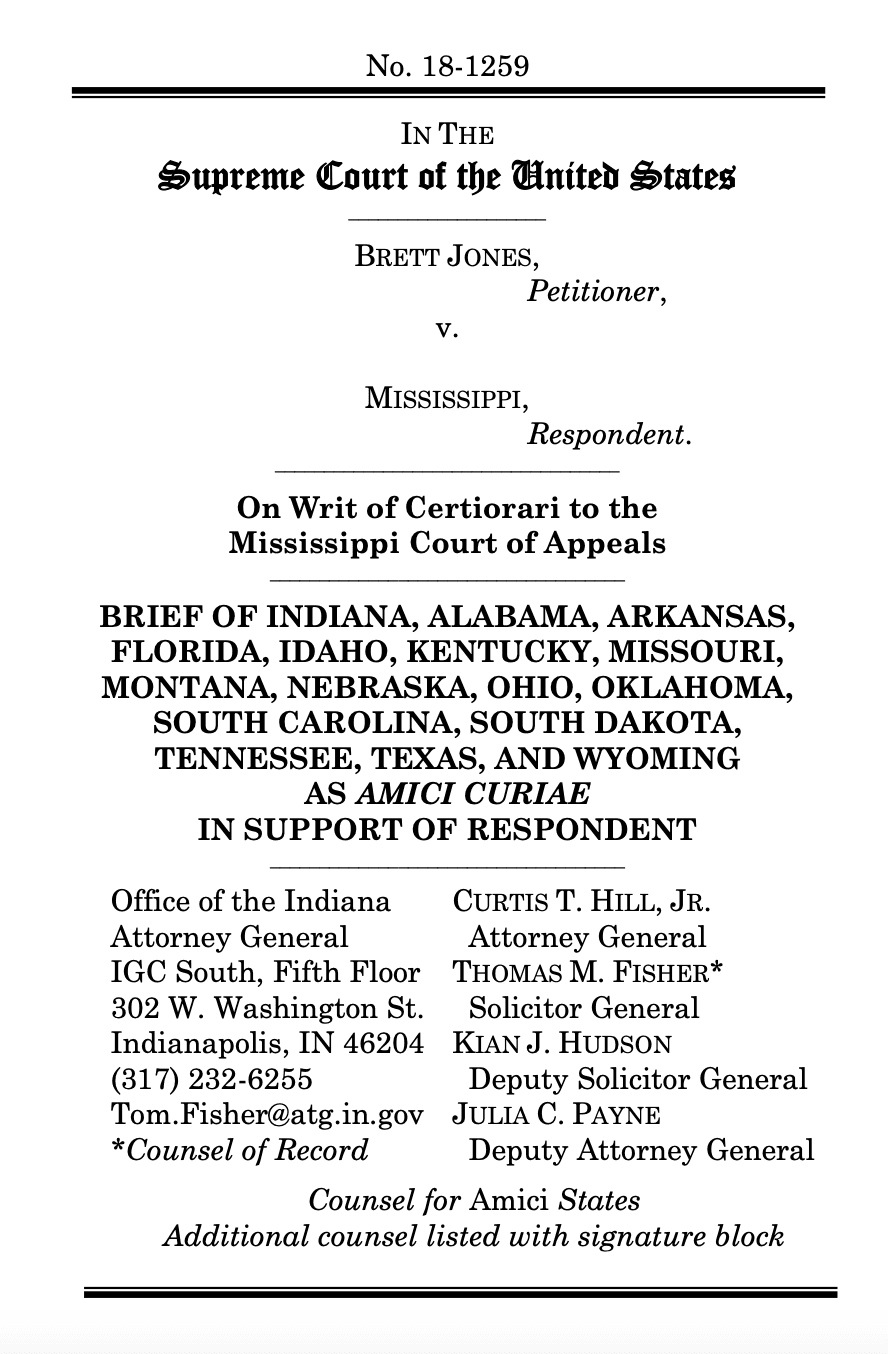
Summary of Argument
The decision below correctly concluded, based on the language and reasoning of this Court’s precedents—including Miller v. Alabama, 567 U.S. 460 (2012), and Montgomery v. Louisiana, 136 S. Ct. 718 (2016)—that the sentencing court complied with the Eighth Amendment when it sentenced Brett Jones to life without parole while “cognizant of the fact that children are generally different [and] that consideration of [these] factors and others relevant to the child’s culpability might well counsel against irrevocably sentencing a minor to life in prison,” App. 149. The Eighth Amendment requires nothing more.
1. The origins of this case trace to a series of recent decisions in which the Court has—over vigorous and well-reasoned dissents—expanded its Eighth Amendment doctrine to apply categorical restrictions to prison sentences imposed for crimes committed by juveniles. This case arises from the last two of these decisions—Miller, which held that the Constitution prohibits mandatory life-without-parole sentences for juveniles, and Montgomery, which held that Miller applies retroactively to cases on collateral review.
Petitioner seeks to stretch these already-doubtful precedents to create a new categorical rule for discretionary juvenile life-without-parole sentences—that sentencers must specifically find that a juvenile murderer is “permanently incorrigible” before imposing such a sentence. Pet. Br. 1. And even beyond a specific factual finding, Petitioner insists that the Eighth Amendment categorically “forbids sentencing a corrigible juvenile to life without parole,” id. at 31, which would imply that federal courts have the power to overturn a state juvenile life-without-parole sentence if they conclude that the state sentencer incorrectly found the juvenile incorrigible, see id. at 32–36 (urging the Court to answer the incorrigibility question itself). Petitioner’s theory would thus require States to convince a state sentencer and a federal judge of a juvenile’s “incorrigibility”—a prediction difficult for even trained psychologists to make. See Graham v. Florida, 560 U.S. 48, 73 (2010) (quoting Roper v. Simmons, 543 U.S. 551, 572 (2005)).
The Court should refuse to endorse this additional intrusion into States’ sovereign interests. Petitioner’s rule would oblige federal courts to review state sentencing transcripts line by line and second-guess state sentencers’ evaluation of the evidence—something federal courts do not do even in capital cases. See Eddings v. Oklahoma, 455 U.S. 104, 117 (1982).
The premise of Petitioner’s theory is that the Eighth Amendment compels a rehabilitative—rather than retributive—penological theory and thus forbids a State from imposing a life-without-parole sentence on a juvenile unless it shows that the juvenile “is incapable of rehabilitation.” Pet. Br. 15. This premise is squarely contradicted by the Court’s decisions, which have long held that “[r]etribution is a legitimate reason to punish,” Graham, 560 U.S. at 71, and that the Constitution places “the primacy . . . in setting sentences” in state legislatures, not federal courts, id. at 87 (Roberts, C.J., concurring in judgment).
2. Moreover, regardless whether the Court takes a skeptical view of its recent Eighth Amendment decisions, Miller and Montgomery themselves merely prohibit mandatory juvenile life-without-parole sentences. Miller held that the Eighth Amendment prohibits courts from imposing life-without-parole sentences without considering “youth (and all that accompanies it),” because doing so “poses too great a risk of disproportionate punishment.” 567 U.S. at 479. And Montgomery recognized that because Miller is premised on the substantive right to be free from grossly disproportionate sentences, its rule is retroactively applicable to cases on collateral review. Miller and Montgomery thus merely require that “the sentencing authority take into account how children are different, and how those differences counsel against irrevocably sentencing them to a lifetime in prison,” id. at 480, by “consider[ing] mitigating circumstances before imposing the harshest possible penalty for juveniles,” id. at 489; Montgomery, 136 S. Ct. at 735 (explaining that Miller requires “[a] hearing where youth and its attendant circumstances are considered as sentencing factors”).
This rule accords with the Court’s precedents “demanding individualized sentencing when imposing the death penalty”—precedents upon which Miller itself explicitly relied. Miller, 567 U.S. at 475–476. The Court’s death-penalty decisions merely prohibit States from “cut[ting] off in an absolute manner” the consideration of mitigating evidence or so limiting its weight “that the evidence could never be part of the sentencing decision at all.” McKoy v. North Carolina, 494 U.S. 433, 456 (1990) (Kennedy, J., concurring). Short of that, these decisions permit States to limit “the manner in which [the] evidence may be considered,” Saffle v. Parks, 494 U.S. 484, 491 (1990), in light of States’ “constitutionally permissive range of discretion” in determining the procedure for “imposing sentences,” Blystone v. Pennsylvania, 494 U.S. 299, 307 (1990). The Court’s capital-punishment jurisprudence does not permit federal courts from second-guessing state sentencers’ judgments regarding the ultimate justice of a capital sentence. The Court should respect the analogy it drew in Miller and refuse to license such second-guessing here as well.
3. Because Miller and Montgomery merely require sentencers to consider a juvenile’s youth before imposing a sentence of life without parole, when such sentences are discretionary they necessarily comply with these decisions. Sentencers deciding whether to impose such sentences will invariably consider the offender’s youth and any related circumstances. Particular factual findings or precise verbal formulations are thus unnecessary to protect the right announced in Miller and would improperly undermine States’ authority to set their own rules of criminal procedure.
Miller announced a single, categorical rule prohibiting mandatory juvenile life-without-parole sentences. The Court should refuse to expand that rule still further. The decision below correctly held that state sentencers may impose life-without-parole sentences on juvenile murderers without making on-the-record findings that such murderers are permanently incorrigible. That decision should be affirmed.
Open Amicus Briefs as PDF